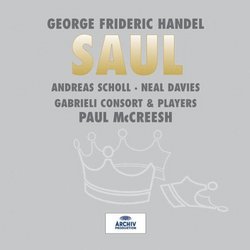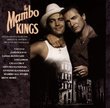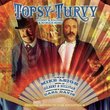| All Artists: George Frederick Handel, Paul McCreesh, Gabrieli Players, Timothy Roberts, Susan Hemington Jones, Angus Smith, Tom Phillips, Andreas Scholl, Jonathan Lemalu, Mark Padmore, Nancy Argenta, Neal Davies, Paul Agnew, Susan Gritton Title: Handel: Saul Members Wishing: 0 Total Copies: 0 Label: Archiv Produktion Release Date: 4/13/2004 Album Type: Box set Genre: Classical Styles: Opera & Classical Vocal, Historical Periods, Baroque (c.1600-1750) Number of Discs: 3 SwapaCD Credits: 3 UPC: 028947451020 |
Search - George Frederick Handel, Paul McCreesh, Gabrieli Players :: Handel: Saul
 | George Frederick Handel, Paul McCreesh, Gabrieli Players Handel: Saul Genre: Classical
Saul is one of Handel's most dramatic and touching oratorios. Saul's insane jealousy and its tragic results are movingly told, with rich characterizations for the main characters and some of the composer's most colorful mu... more » |
Larger Image |
CD DetailsSynopsis
Amazon.com Saul is one of Handel's most dramatic and touching oratorios. Saul's insane jealousy and its tragic results are movingly told, with rich characterizations for the main characters and some of the composer's most colorful music. The addition of a carillon is exotic and flavorful; the trumpets and drums are exciting. McCreesh underlines the drama with his orchestra's crisp attacks and the chorus has real personality, whether in the songs of praise or the laments. Neil Davies' rich bass is remarkably expressive and fluid as Saul, while countertenor Andreas Scholl is triumphant as David; his tone is rich and full, capable of expressing anger, grief, loyalty. Mark Padmore uses his lovely, pliant tenor with warmth as Jonathan, and Susan Gritton's Merab is stunning. The rest of the cast is as emotionally involved as they are musically, which is to say, magnificently. John Eliot Gardiner's recording on Philips is excellent too, but this one beats it by a slim margin. --Robert Levine Similarly Requested CDs
|
CD ReviewsBeyond beauty in the realm of English national emergence Jacques COULARDEAU | OLLIERGUES France | 11/23/2006 (5 out of 5 stars) "From the very start you know you are entering a masterpiece performed by one of the greatest living conductors. First the use of instruments. Each one has a particular part to play and, even in the most unified tuttis of the orchestra, each instrument plays its role and can be followed faithfully without getting lost in some kind of blended melting pot. This is admirable from the opening notes right on till the end. Then Handel uses voices in a very creative way too. David is an alto, which is normal in the 18th century since he is the hero and no one is going to cast a shadow on him. The alliance of this alto with the tenor Jonathan or the soprano Michal, or even the antagonistic soprano Merab, leads to giving each voice a real dramatic depth. The two sopranos are not used the same way since they are opposed in meaning, in attitude towards David. But there is another level that is Handel's mark on the operatic music of his time: the use of the English language. He has been able to capture the very harmony of the language itself and he casts his music, his singing, his variations inside the stress patterns and rhythm of the language and detonates the poetry of words in perfect tempo with the beauty of notes and intervals. Even the difficult English diphthongs flow into the music naturally and so fluently they seem to have been invented for the music, though it is indeed the reverse. Finally, before speaking of the message carried by the opera - or oratorio if you prefer - I have to emphasize the fact that this is a Biblical episode that is essential in our culture. It is the famous battle between David and Goliath, an archetypical episode in our civilization, as well as in the Bible. The little one against the big one. The plebeian one defending the realm. The weak one using his intelligence and skills to defeat the powerful one. We have to add to this the semitic stone civilization is defeating the northern Philistine metal civilization. And of course we have to think of the last descendent of David's line, Jesus. David is thus the embodiment of Jesus in our heritage, and, today probably more than in Handel's time, David has been immortalized by Michelangelo's carved representation of David killing Goliath with a stone and then using Goliath's own sword to behead him, just like Solomon will hire metal craftsmen from the north to build the Temple, hence using the skills of others, foreigners, even enemies to strengthen the faith and the realm of Israel. In this opera Handel concentrates on Saul's fall and the annunciation of David's rise. Saul is shown as jealous, insecure, full of anger which leads him to rejecting the basic rules of Israel and God, exemplified in Saul's recourse to the witch of Endor. Handel makes this witch a tenor, hence a man, and McCreesh identifies him to the High Priest by having only one tenor for both. The meaning is simple. God knows everything and is everywhere, and everything that exists is God's creation, even what is condemned by Israel's law. Yet we have to go beyond this simple religious fable and understand it is the national theme emerging in England that is really dealt with here. A king must be truthful, humane, law abiding, god fearing. A nation must support their king if he is what he should be. The king is the emblem of national identity. Thus Saul becomes the negative emblem of the Stuarts of old, and thus this opera is revolutionary, the continuation of the Glorious Revolution that has rid England of these Stuart kings. Yet the national identity of England can only be found in David's descendent known as Jesus, hence it can only be founded on Christianity.
Dr Jacques COULARDEAU, University Paris Dauphine, University Paris 1 Pantheon Sorbonne " |

 Track Listings (30) - Disc #1
Track Listings (30) - Disc #1







